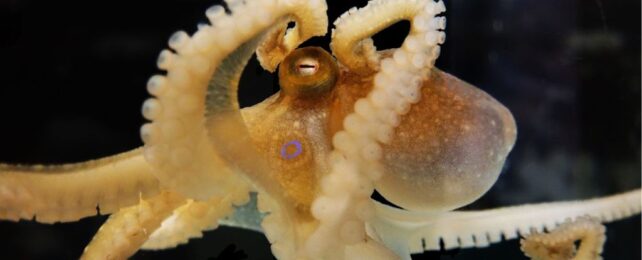Cephalopods may have the oldest sex chromosomes of any animal, according to a recent discovery in the octopus genome.
That's a big deal given that scientists didn't know until now that these oddball creatures even had a form of sex determination written into their genes. To determine if an octopus is male or female, biologists have relied purely on observation, differentiating between which individuals lay eggs versus which produce sperm.
Searching the octopus genome had shown no clear sign of a sex chromosome system. Scientists were beginning to wonder if perhaps cephalopods were like some fish and reptiles, with sex determined through environmental factors such as the temperature at which eggs are kept rather than the inheritance of distinct chromosome.
At last, researchers at the University of Oregon claim to have solved the mystery.
Their preprint study, which is currently under peer review, provides the first evidence of genetic sex determination among octopuses.
Examining the genes of the California two-spot octopus (Octopus bimaculoides) – the first cephalopod to have its whole genome sequenced – researchers have finally found a unique chromosome pair.
They discovered it on chromosome number 17, and it only stood out to researchers when they compared the male octopus genome that had been fully sequenced to a female one. The female octopus seemed to be missing one of their two copies.
Digging further, researchers say they found clear signatures of a ZW sex-determination system, which is seen in birds, crustaceans, and some insects.
We humans rely on an XY system, wherein two X chromosomes create the default female body plan, while the presence of a Y chromosome generally triggers the development of male characteristics.
Octopuses have an opposite system. It is the males that typically have a double-Z pair and females that have only one Z chromosome.
To see if this system was present in other cephalopods, researchers compared the genomes of three octopus species, three squid species, and a nautilus.
They concluded that the Z chromosome is an "evolutionary outlier" that stands apart from similar chromosomes in close relatives.
Only the genomes of the bobtail squid (Euprymna scolopes) and the East Asian common octopus (Octopus sinensis) had similar outlier signatures, but because these creatures are from different lineages, it suggests the Z chromosome originated before their split.
As such, researchers at the University of Oregon argue that the Z chromosome is "of an ancient, unique origin" that probably arose between 455 and 248 million years ago. If the chromosome appeared towards the earlier end of that timeline, the octopus could have the oldest animal chromosome yet found, beating even some insects which are thought to have sex chromosomes that date back 450 million years.
Compared to those of octopuses, however, these arthropod sex chromosomes are poorly conserved across species.
For comparisons, the oldest accepted vertebrate chromosome is that of a sturgeon fish, which is thought to be about 180 million years old. Sturgeon fish females have a ZW sex chromosome set pair as opposed to the female octopus's 'hemizygous' Z chromosome. It's possible the octopus's corresponding W chromosome may have been lost over time in a manner similar to the ill-fated trajectory of the Y chromosome in humans.
The story behind sex chromosomes has changed a lot in recent years. Once, they were thought to be intrinsic features of sex determination in animals. But biological research tends to be biased towards mammals. As it turns out, some fish and reptiles, like crocodiles, don't have sex chromosomes at all. The sex of their offspring is instead determined by other, external factors through epigenetic regulations.
Clearly, there is still much to be learned about how sex chromosome evolved, and why. Octopuses, with their deep evolutionary roots could be fascinating models for future research.
"The data presented in this paper definitely suggests that cephalopods have among the oldest sex chromosomes in both animals and plants," independent evolutionary scientist, Sarah Carey, told Carissa Wong at Nature.
"This is such a cool time to be working on the genetics of sex chromosomes."
The research is available on preprint server bioRxiv.
